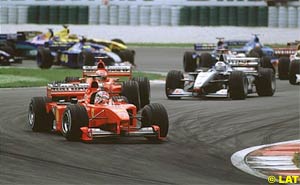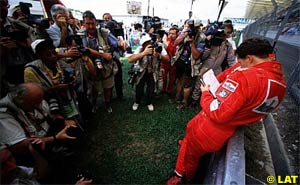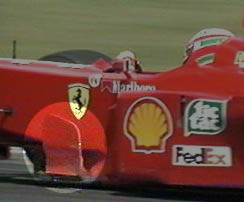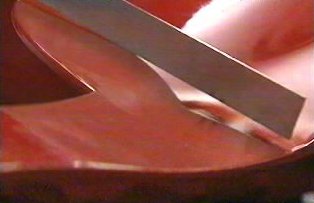
Atlas F1 Senior Writer
Alongside on-track racing, Formula One is as much about the off-track politicking and regulation challenges. Seeing the competition decided in court has become very much a fixture of this sport as pit stops or on-track passing. But how do the wheels of justice really turn in Formula One? How did it work in the case of Jordan and Jarno Trulli at the 2001 US Grand Prix? Or in the case of Michael Schumacher and the Benetton team in 1994?
Atlas F1's Thomas O'Keefe brings an unprecedented study on the FIA's justice system and its very own Court of Appeal. In a four part feature, he reveals never-before-published evidence on how this unique system works
The most famous recent episode of FIA jurisprudence was Ferrari's challenge to the decision of the Stewards on Sunday, October 17th 1999 at the Grand Prix of Malaysia, when they disqualified the Ferraris of Michael Schumacher and Eddie Irvine for a "barge board" infraction and took away their Ferrari, 1-2 finish, Schumacher having gifted Irvine the victory.
The disqualification for out-of-spec barge boards, sometimes called turning vanes (they were one centimeter beyond regulation limits) came about after McLaren snitched to the FIA after Ferrari won the Malaysian race and suggested that the barge boards be checked. The McLaren mechanics became suspicious of the barge boards, which were dutifully covered by the Ferrari mechanics with elegant red leatherette covers whenever the Ferrari returned to the pits and was backed into the garage. But significantly, McLaren did not complain about the barge boards until after the race was over and after the Ferraris had won so convincingly.
As they prepared for the hearing, Ferrari were looking at long odds, since 12 of the 15 appeals of the Stewards' decisions to the International Court of Appeal over the past 25 years had been thrown out. Indeed, the last prior successful appeal was back in 1995 in a fuel sample controversy. And before that, back in 1976, there had been another isolated victory for the competitors over the Stewards.
Englishman James Hunt had won the Spanish Grand Prix in his McLaren M23. After the race, the Stewards determined that the rear of his car was 1.8 centimeters (seven tenths of an inch) too wide and two hours later Hunt was disqualified. Two months later, the Court of Appeal stepped in and reduced Hunt's punishment to a fine and reinstated Hunt's victory, which turned out to be another crucial decision by the Court of Appeal, since Hunt became the 1976 World Champion over Niki Lauda, then driving for Ferrari, by just 1 point.
Returning to Paris and the Malaysia 1999 appeal, the hearing was on Tuesday, October 22nd 1999, before the International Court of Appeal. Ferrari's formidable acts of legal legerdemain and technical wizardry in putting on their proof saved the day for Ferrari and their points were reinstated, setting up the Championship Showdown for the last race of the season at Suzuka.
In the week before the hearing on the Malaysian barge board controversy, Bernie Ecclestone let it be known that he regarded the disqualification as "nonsense". Max Mosley was quick to note that Bernie had no power over rule enforcement and that the judges would not pay any attention to Bernie's views despite his power over the commercial side of the sport.
The identities of the five member panel of judges assembled to hear the Malaysian case were kept secret by the FIA until the court hearing, presumably so that they would not have tifosi camped out on their doorsteps. When they took the bench, the Chairman of the Court of Appeal was Jose Macedo e Cunha of Portugal. Other members were Gerhard Nurscher of Austria, Philippe Roberti de Winghe of Belgium, Vassilis Koussis of Greece and Jan van Rosmalen of the Netherlands.
Disappointingly, Ferrari's defense team did not actually bring the Ferrari Grand Prix cars into the Paris courtroom to demonstrate the legality of the barge boards - which would have been a pretty sight - but did bring in some sophisticated measuring equipment to support the position that the Stewards at the Malaysian Grand Prix did not have measuring equipment on the scene at Sepang accurate enough to make the judgment call they did, that the barge boards were out-of-spec.
But the most important arrow Ferrari had in its quiver was the fudge factor rule - Article 3.12.1 and 3.12.6 of the Technical Regulations - which the team argued provided a 5 mm tolerance factor for the dimensions of the barge boards. Max Mosley explained how Ferrari's proof and the FIA wiggle room rule led to Ferrari's exoneration:
"Having regard to the fact that the dimensions in no part of the turning vane exceeded the tolerance allowed by the regulations, and having regard to the uncertainty introduced by the methods of measurement and the wording of the regulation itself, the Court of Appeal decided to overturn the decision of the Steward and therefore the original result of the race stands in its entirety."
While Mosley was understandably diplomatic in his language, Ron Dennis of McLaren was disappointed at this reversal of fortune and the intellectual basis for it, finding his team snookered first on the track and then in the courtroom.
"I believe, along with probably every technical director in Formula One, that the manufacturing tolerance referred to under article 3.12.6 of the Technical Regulations has no bearing on any other aspect of the car other than the vertical flatness of the horizontal surfaces that form the underside of the vehicle," Dennis stated after the appeal's decision was made. "We think the push for our sport has inevitably become quite commercial. Everybody wants to have an exciting race in Japan, but I think that the price we have paid for that one race is too great."
Based upon the evidence, the Court of Appeal decided to cancel the Stewards' decision and to ask the FIA to issue a classification of the 1999 Grand Prix of Malaysia confirming the original results, a Ferrari 1-2.
As indicated, Ferrari's success in reversing the Stewards' disqualification was the first successful appeal of a decision of the Stewards since the Brazilian Grand Prix at Interlagos on March 26th 1995, when Michael Schumacher had won the race in his Benetton-Renault and David Coulthard had come second in his Williams-Renault, but both cars were provisionally disqualified because of fuel irregularities in the Elf fuel both teams were using. In the end, constructor points were taken away from the manufacturers and a $200,000 fine was imposed on both Benetton and Williams but significantly, the drivers kept their positions and points.
This Elf fuel case was somewhat unusual, in that the Court of Appeal made a distinction between the teams and the drivers and also took into account that although the fuel was out of spec "no advantage was given to the drivers or the cars in terms of performance."
Mosley explains the rationale for making the distinction: "The point was the fuel was legal in the sense that had it been submitted for inspection before the race, it would have been perfectly all right. The offence was to run the fuel without first submitting it. As the fuel was legal in itself, it did not seem right to penalise the drivers."
As it happened, when the 1999 season moved from calipers in the courtroom in Paris to the racetrack at Suzuka, Mika Hakkinen led all but three laps of the Japanese Grand Prix and won the race and his last World Championship so, in a sporting sense, it worked out for McLaren Mercedes as well that time around.
Right off the bat, the curious phenomenon of being permitted to race while a matter is under appeal should be eliminated. As indicated in Part III of this series, at a critical point in the 1997 season when Jacques Villeneuve and Michael Schumacher were locked in a head-to-head struggle for the World Championship, Villeneuve was penalized for ignoring a yellow flag during Saturday practice for the Japanese Grand Prix, the next to last race.
Villeneuve appealed the penalty but since the matter was not disposed of prior to the race itself, Villeneuve raced on Sunday under a cloud and could conceivably have created a lot of mischief during a race for which he knew he was unlikely to earn points. Summary appeals of each penalty, except for extraordinary circumstances, would eliminate the possibility of racing under appeal.
To begin with, the FIA's settlement of the antitrust case with the European Commission has freed Max Mosley and his minions from the shackles of the commercial side of the sport, allowing the FIA to focus fully on running safe races and running them professionally. And the Ron Dennis feature of the settlement that seems to permit a competitor to challenge a ruling in national courts outside the FIA judicial system cannot help but keep the FIA on its toes.
In addition, the drumbeat from the manufacturers as to the creation of a rival open-wheel series to Formula One once the Concorde Agreement expires on December 31st 2007, puts the FIA's stewardship of Formula One under the magnifying glass, giving the FIA bureaucracy even greater reason to conduct themselves in a fair, even-handed and rational way that will not make the FIA the object of contempt and ridicule.
Moreover, a very new era of transparency has been introduced as to the operations of the International Court of Appeal. In the Jarno Trulli case, for example, pool reporters were permitted to be present and future sessions will be open to observation by reporters.
The one feature of Racing Justice that has been lacking thus far, is any attempt by the International Court of Appeal to act as a body guided by precedent or other supporting authorities, which would be a step forward and would be consistent with the European Commission's declaration that the decisions of the International Court of Appeals be reasoned opinions. The decisions of the Court of Appeal are often bare bones and conclusory. Part of the strength of an effective judicial system is predictability and continuity, regardless of who the judges or the competitors are, a quality even more essential in a sport like Formula One where the suspicion that commercial interest, not justice, drives the decision-making process, is ever present.
Finally, in a system that is as technical and rigid as Formula One, it is difficult to develop a Rule of Reason that will permit the Stewards or at least the Court of Appeal to take into account exceptional circumstances so that their rulings don't look foolish. Dickens once said that "the law is an ass, an idiot," and there have been a handful of rulings over the years that were most Dickensian in that sense.
This season, the penalty imposed on Ralf Schumacher for marginally crossing the white line exiting the pits in the 2001 European Grand Prix seemed harsh and must have totally deflated Ralf. Also questionable was the FIA's decision to disqualify David Coulthard's McLaren for a drooping front wing after the Brazilian Grand Prix in 2000, thus depriving Coulthard of his second place finish.
According to Max Mosley, what seemed a harsh penalty was a self-created hardship by McLaren: "The reason Coulthard was disqualified from Brazil in 2000 was it became evident that the team, instead of setting the wing at the correct height, for which there is a tolerance, set it at the extreme limit of the tolerance. When it then moved, the car became illegal. They had only themselves to blame. The tolerance is there to avoid such problems."
It will be remembered that this was the race where advertising boards fell down and the Interlagos track pre-race repaving job was even more bumpy than usual. Notwithstanding McLaren going for the edge of the tolerances, for the Stewards to find a violation of that kind in that setting exposed the FIA to the kind of charge of unfairness and foolishness that perpetuates the Ron Dennis and Dickensian view of FIA Jurisprudence that persists in many quarters.
Although carving out a Rule of Reason principle for exceptional circumstances would itself be difficult because of the subjective element inevitably being introduced by such a provision, having a Rule of Reason available as a part of the panoply of doctrines the Stewards can apply could conceivably save the sport from shooting itself in the foot any more often than absolutely necessary.
As indicated above, the FIA's way is not to take into account exceptional circumstances. But could not some kind of flexibility be introduced under the current rules to avoid draconian outcomes that undermine what we all came to see: good racing? The answer is that the latitude to come up with proportionate penalties is already embedded the FIA's own rules.
Rule 54(a) of the F1 Sporting Regulations provides that "it shall be at the discretion of the stewards to decide, upon a report or a request by the race director, if a driver or drivers involved in an incident shall be penalised." We have come to understand that the Stewards' usual reaction to an incident on the track is the 10-second stop and go penalty, which really works out to cost the driver 30 plus seconds - almost a quarter of a lap on most circuits. And yet Rule 54(a) of the Code gives the Stewards a whole laundry list of powers that could and should be drawn upon:
Note that the omnipresent "stop and go" penalty is not even listed in this catalogue of powers, although it is listed among the "time penalty" sanctions under Rule 53 of the F1 Sporting Regulations. In fact, as we have seen over and over again, the stop and go is not a very "sporting penalty" and must take the heart away from all but the stoutest of drivers who, after all, are risking their lives out there for every tenth of a second.
To be sure, it is a penalty that is administratively easy for the Stewards to impose as a catch-all but may be disproportionate to the conduct being punished and certainly compromises the quality of the racing on the track. With two-way radio communications an integral part of today's races surely a broader menu of graduated punishment, fines and other time penalties could be developed and imposed without taking the car off the track for a race-killing amount of time.
In addition, the prohibition that "whilst a car is stationary in the pits as a result of incurring a time penalty it may not be worked on," seems to add insult to injury and could conceivably be dangerous if a car that needed repairs because of the incident that drew a penalty was not able to be fixed before it went back on the track. The FIA should be urging the Stewards to recognize their responsibility to come up with Punishments that Fit the Crime in the interests of keeping racing fair but not sacrificing competition altogether on the altar of administrative clarity.
While this series on Racing Justice has been running on Atlas F1, Max Mosley has publicly commented on the role of the FIA's International Court of Appeal. It should be noted that Mosley was gracious enough to review the series in draft form months ago and, while he did not agree with all that was written, he provided his insights on portions of the text.
On February 7th and 8th 2002, Mosley met with the Formula One press in London and elaborated on ways to handle disputes between the teams and race officials in a timely way, reserving the elaborate appeals we have chronicled for the rarest of occasions. In his view, the fact that Formula One has become big business has led to the kind of appeals we saw at Indy 2001, where the result, as explained in Part I of this series, meant a lot of cash to Jordan but little of significance as precedent to the sport itself.
Mosley's approach would be to strip away a lot of the layers of due process now embodied in the FIA's International Sporting Code and to emphasize getting most disputes resolved by Sunday Night, race day:
[…]
"If you did what I've just said, the thing would all be over on Sunday and that would be the end of it, and if the stewards refuse leave to appeal, [the competitor's] chance of getting it from the Court of Appeal, under that system, they would have to show that they have an arguable point of interpretation of the regulations. The chance of it not being all over the Sunday night would be minimal.
[…]
"In Formula One the teams don't like the idea. They are so conservative, it's very difficult to get them to move. So it needs development, but the principle is getting it all done on Sunday night except when there's something really unusual. And also [perhaps here Max was thinking of the Missing Steward at Indy] we're going to be a little bit careful about the stewards and how they work."
In truth, the Final Answer.
 It will be recalled that 1999 was the year Schumacher had the big shunt at Silverstone and came back at the end of the season after recovering from his leg injury to help Irvine in his efforts to win the World Championship. The strong showing by Ferrari in Malaysia meant that Irvine had 70 points and Hakkinen 66, with only the Japanese Grand Prix at Suzuka left to go. After the disqualification, Hakkinen had 72 points, Irvine 60, a gap Irvine could not close even if he won Suzuka, which meant that if the disqualification was upheld Hakkinen would be declared World Champion. Furthermore, the Malaysia 1-2 would have meant Ferrari would seal their first Constructors' Championship title in over 15 years.
It will be recalled that 1999 was the year Schumacher had the big shunt at Silverstone and came back at the end of the season after recovering from his leg injury to help Irvine in his efforts to win the World Championship. The strong showing by Ferrari in Malaysia meant that Irvine had 70 points and Hakkinen 66, with only the Japanese Grand Prix at Suzuka left to go. After the disqualification, Hakkinen had 72 points, Irvine 60, a gap Irvine could not close even if he won Suzuka, which meant that if the disqualification was upheld Hakkinen would be declared World Champion. Furthermore, the Malaysia 1-2 would have meant Ferrari would seal their first Constructors' Championship title in over 15 years.
"Ferrari came with a very accurate jig and were able to show the court that the turning vane, when at a certain angle to the car, had no dimension which exceeded the tolerance of 5 mm. That is to say that when the vane is slightly turned at an angle, the dimension, the shadow, on one side decreases and on the other side increases. They were able to show that all the relevant dimensions were within the 5 mm tolerance.
 "In addition to that they criticized, I think with some justification, our methods of measurement. There was also criticism by the court as to the clarity of the regulation itself. Those two criticisms, of the methods of measurement and of the clarity of regulation, are going to be looked into very carefully.
"In addition to that they criticized, I think with some justification, our methods of measurement. There was also criticism by the court as to the clarity of the regulation itself. Those two criticisms, of the methods of measurement and of the clarity of regulation, are going to be looked into very carefully.
 These days, "no performance advantage" is no defense. Article 58 of the International Sporting Code makes it explicit that "if a car is found not to comply with the technical regulations, it shall be no defense to claim that no performance advantage was obtained." It was to be four more years before the Stewards would be successfully called to account again.
These days, "no performance advantage" is no defense. Article 58 of the International Sporting Code makes it explicit that "if a car is found not to comply with the technical regulations, it shall be no defense to claim that no performance advantage was obtained." It was to be four more years before the Stewards would be successfully called to account again.
 On the positive side of things, there is much evidence that the FIA is determined to render justice in arbitrating sporting disputes, even if it has the inevitable side effect of calling into question the competence of its scrutineers and Stewards as occurred in Indy 2001, Malaysia 1999 and Silverstone 1998.
On the positive side of things, there is much evidence that the FIA is determined to render justice in arbitrating sporting disputes, even if it has the inevitable side effect of calling into question the competence of its scrutineers and Stewards as occurred in Indy 2001, Malaysia 1999 and Silverstone 1998.
"What I would like to do is change the way we do things. Let's take Formula One . . . . You have the local clerk of the course, you have our race director, Charlie Whiting. I would like him to impose the penalty and then the team to appeal to the stewards if they are not [happy] with the penalty, and then there's a proper hearing with both sides and then only appeal to the Court of Appeal with leave, either leave of the stewards, or leave of the Court of Appeal [itself] if the stewards refuse. That would cut down the number of appeals, there are too many appeals now.
Please Contact Us for permission to republish this or any other material from Atlas F1.
|
Volume 8, Issue 8
2002 Season Preview
2002 Drivers Preview
2002 Teams Preview
2002 Technical Preview
Men and Motors
Articles
The FIA's Court of Appeal: Part IV
Off-Season Strokes
Columns
Elsewhere in Racing
The Weekly Grapevine
> Homepage |